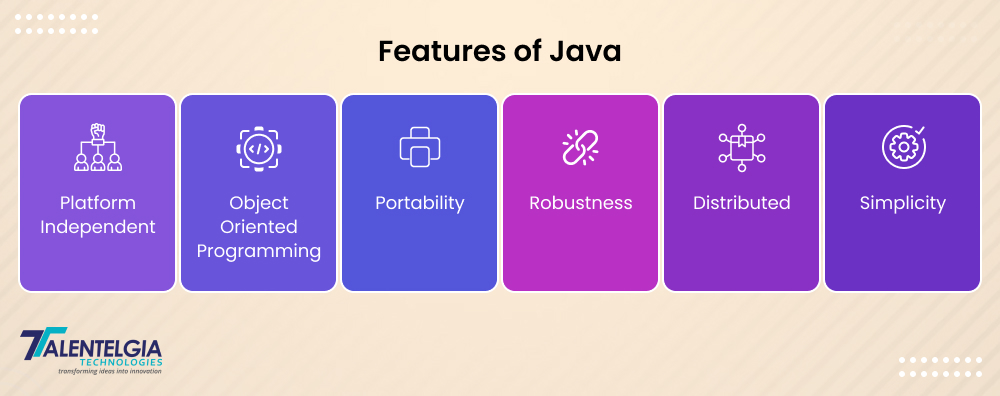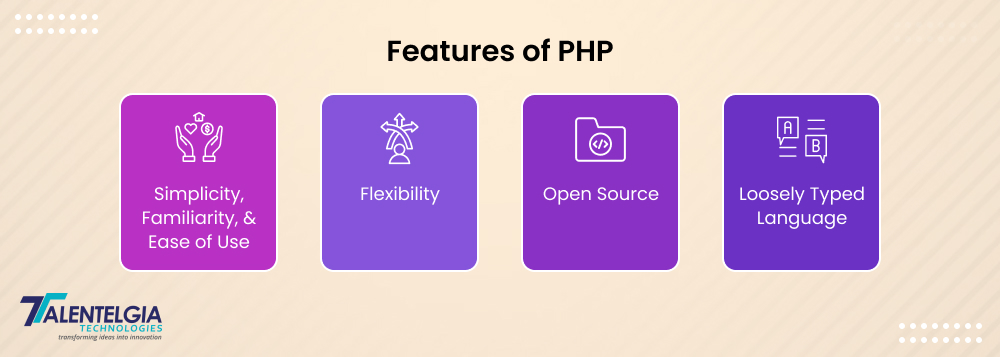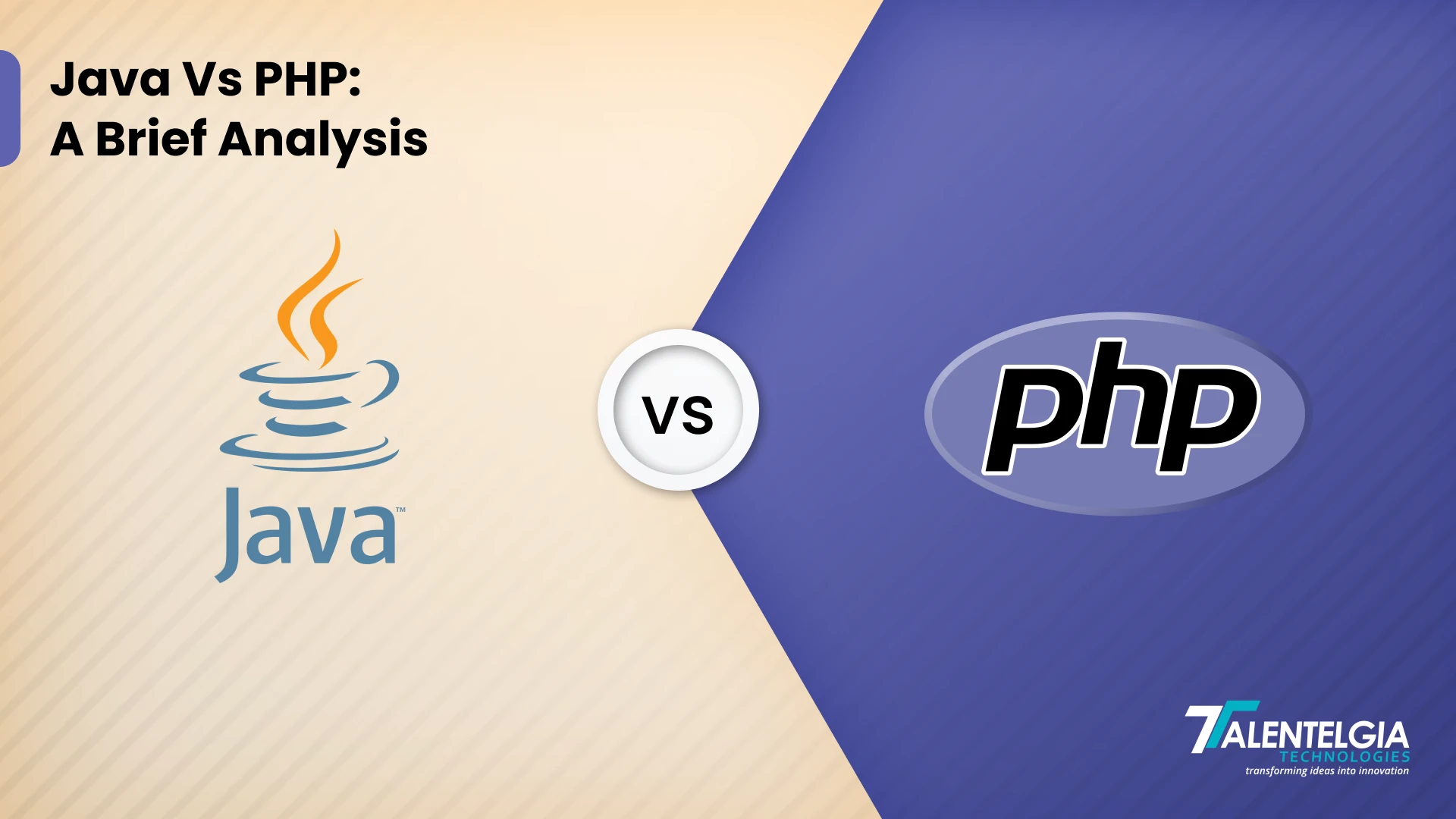Java vs PHP are the two programming language giants that have been controlling the web landscape for decades. However, in today’s web landscape, with an ever-expanding list of possible choices for developing your next application, deciding which one is more suitable remains an open question. Both possess a unique strength and community support. Depending upon your application type – whether complex enterprise-level systems or dynamic websites, understanding the differences between Java vs PHP can assist you in choosing one for the better. This blog will make a deep-dive comparison of each language’s features and performance to tell you which option is best. Let’s examine what makes these languages tick as we explore what makes them a better fit against each other.
What is Java?
Java is a programming language and computing platform initiated in 1995 by Sun Microsystems. During its development, it gained importance in the foundation of several applications and services. It currently powers most of the digital world, and therefore, makes possible reliable solutions for businesses and developers.
Many modern Java applications combine the runtime and application, but some websites and applications still require desktop Java. For these, users may need Java 8 installed. Developers and learners should visit dev.java to explore programming resources, while business users can visit oracle.com/java for more details.
Developers worldwide use it because of scalability, portability, and powerful community support offered by Java.
Features of Java

Java offers various features that are preferred by most developers. This makes sure that different applications are assured of high performance, security, and ease of use. Here are some of the main features of Java:
Platform Independent
Java’s compiler converts source code into bytecode. That bytecode can be run on any platform, such as Windows, Linux, or macOS. For instance, a program compiled on Windows can be run on Linux easily. Each operating system uses its own JVM but the overall output remains the same across platforms. This makes Java a platform-independent language.
Object Oriented Programming
Java follows an object-oriented programming principle. This means that it focuses on objects and classes to structure programs. It organizes programs as collections of objects with each object representing a particular instance of class. The four key concepts of object-oriented programming in Java are:
- Abstraction
- Encapsulation
- Inheritance
- Polymorphism
Portability
Java programs written on one machine can run on another without modification. This is because the bytecode is platform-independent, it can be executed on any system. Java offers the “Write Once, Run Anywhere” (WORA) capability, producing .class files in binary format that are not architecture-dependent. This portability is a primary reason for Java’s adoption around the globe by the enterprise IT industry. This also gives Java an upper edge in the debate between Java vs PHP.
Robustness
Java is designed to be robust and focus on reliability. It catches errors early with its compiler, which can detect things that other programming languages may not. Features such as garbage collection, exception handling, and memory allocation make Java a very reliable programming language. The strong type-checking mechanism of Java also ensures that code behaves predictably, thereby reducing runtime errors. Its runtime environment also minimizes crashes, making it ideal for building secure and stable applications.
Distributed
You can develop distributed applications with Java. The use of technologies such as RMI and EJB allows Java to develop programs that can run across several systems connected by the internet. Its platform independence ensures smooth communication between different systems, regardless of their underlying architecture. This ability makes it a preferred choice for creating scalable, network-centric applications used in enterprise environments.
Simplicity
Java’s syntax is simple and familiar to programmers writing in C or C++. It eliminates abstractions like pointers and multiple inheritances, which makes the code easier to construct, debug, and maintain. This makes it one of the most seamless programming languages in use.
Quick Read: Best java Frameworks you must know
What is PHP?
PHP is a widely used open-source scripting language, especially favored for web application development. Originally an acronym for “Personal Home Page,” PHP now stands for “Hypertext Preprocessor.”
It is a server-side scripting language and integrates well with HTML to deliver dynamic web content. One of the fastest and most user-friendly languages out there, it is still at the core of modern web development today.
Features Of PHP

PHP offers a dynamic web development environment combined with flexible options for custom PHP development. Its capabilities allow the effective development of very powerful features for creating dynamic sites and applications on the web. Some of these features include:
Simplicity, Familiarity, and Ease of Use.
PHP is known for its simplicity, familiar syntax, and ease of learning. Its syntax is very similar to languages like C or Pascal, so it is logical and well-organized. Even people with very basic programming experience can easily understand and use PHP. For new users, PHP proves to be a highly reliable, clean, and efficient language that is both in demand and advantageous.
Flexibility
PHP is highly flexible and has the capacity to be embedded smoothly in a seamless way with HTML, XML, JavaScript, and other technologies. It works very flawlessly in multiple operating systems such as Windows, Unix, Mac OS, and Linux. PHP scripts can run on myriad devices, like laptops, tablets, or even smartphones.
The language easily integrates with different databases and supports the creation of desktop applications through advanced PHP features. PHP scripts can be executed from the command line or directly on a machine. This makes it suitable for heavyweight applications without relying on a server or browser. In addition, PHP serves as an excellent interface with relational databases.
Open Source
All PHP frameworks are open-source, which implies they are free to use. Users can download PHP, create an application or project without any charges, and get started without paying anything. This cost-effectiveness also benefits the companies by reducing software development expenses while maintaining reliability and flexibility.
PHP supports several popular databases such as MySQL, SQLite, Oracle, Sybase, Informix, and PostgreSQL. It has libraries that ensure seamless interaction with those databases and web servers. It is also open to developers’ contributions through error reporting, code inspection, and fixing bugs. There are frameworks such as CodeIgniter, Zend Framework, and CakePHP, which utilize PHP for the betterment of their development capabilities.
Loosely Typed Language
PHP is a loosely typed language and hence allows the developers to use variables without declaring data types. In fact, at runtime, the language automatically determines the type of data, making things easier for the developer.
This approach reduces the need for strict type definitions, making coding faster and more adaptable. Developers can focus on functionality without worrying about type enforcement errors. In addition, PHP’s ability to handle type conversions smoothly enables smoother integration with various data sources and systems.
Java Vs PHP Which is Better?
In web development, the choice of programming language can be the make-or-break point for optimal performance, security, and scalability. When comparing Java vs. PHP, each has its distinct strengths and weaknesses. While PHP is well-known for its ease of use and rapid development, Java is favored by enterprise-level organizations due to its robustness and security. Let’s take a look at a more detailed comparison of these two programming languages.
Syntax
The syntax is very different for Java and PHP. Java is a statically typed language. This means that you need to declare all variables with a particular data type. PHP is dynamically typed where it doesn’t need the declaration of any data type. Java uses semicolons at the end of each statement, whereas PHP is not very rigid and doesn’t require it. These syntax variations affect the ease of programming. Developers have to spend more time on Java in dealing with variable declarations and semicolon placements, whereas PHP offers a simpler approach.
Popularity
Java and PHP are two languages widely regarded by developers and companies alike. According to Statista, as of 2024, the two most widely used programming languages by software developers across the globe are JavaScript and HTML/CSS, with over 62% of respondents reporting that they use JavaScript.
Though JavaScript is successful in both front-end and back-end, Java and PHP hold a leading position in the domains of knowledge. Developers primarily choose Java when they are dealing with large application development in the enterprise environment. Java is especially preferred for building large-scale applications in an enterprise environment. This is because it is stable and secure. PHP, on the other hand, remains preferred for web applications, particularly with dynamic websites as well as content management systems. These languages play a significant role in how the software landscape is developed with the rise of newer technologies. Let’s compare the two languages:
Performance
The performance of PHP vs. Java depends on their different ways of executing code. Java pre-compiles code into bytecode. This allows faster execution, while PHP interprets code at runtime. Thus, Java is faster than PHP.
Benchmarks indicate that Java has better CPU usage, memory usage, and execution time. This makes it a perfect application for high-performance applications requiring complex code and fast processing.
Learning Curve
The learning curve is very crucial for developers as well as for businesses because it impacts the availability and the cost of the developers. While comparing PHP vs Java, the learning curve is more straightforward in PHP. It has a very friendly syntax similar to English with fewer symbols. It is therefore easier for the developers to read and write.
On the other hand, Java has a relatively steep learning curve. Still, developers who are already familiar with languages like C++ or C will find it easier to pick up Java. Product owners familiar with platforms like Oracle and SCRUM can also apply their skills immediately for Java development without having to invest too much time learning the language.
Development Cost
The advantage of using PHP is its ready availability in the market at relatively low-cost developers. Businesses often choose it for hosting low-cost web applications. Yet, not every project can be developed on a limited budget by using PHP as the best one. Rather, Java seems to be one of the ideal choices for complete application development solutions, offering an extensive variety of libraries with powerful tools and applications.
Though PHP might be still affordable for very straightforward web applications, Java guarantees greater scalability and dependability for better long-term adaptability by offering businesses with applications scaling. Due to its extreme adaptability, it can perform quite a broad number of different operations and tasks to process any possible data types efficiently. Furthermore, Java provides excellent object-oriented programming facilities plus extensive documentation. This enables developers to have flexibility and ease in development, maintenance testing, and deployments.
In the comparison of Java vs PHP, the strengths of the languages depend on the type of project. Java is used for large-scale enterprise-level applications, but PHP is a leading choice for web applications due to its cost-effectiveness.
Conclusion
Java and PHP are both good for different needs in the world of web development. Java is strong in large-scale, enterprise-level applications because of its robustness, platform independence, and scalability, which makes it a preferred choice for complex, high-performance systems that require reliability and security. Its wide ecosystem and object-oriented capabilities provide long-term flexibility for businesses that aim to grow and adapt.
Most developers use PHP to develop dynamic web applications and content management systems due to the simplicity, flexibility, and cost-effectiveness offered. It is straightforward to understand, and seamlessly integrates with web technologies, enabling the rapid development of smaller-sized projects. Our opinion? choose Java if there is a possibility of large-size, complex, and complicated. On the other hand, go for PHP when in need of swift, budgetary web development.


 Healthcare App Development Services
Healthcare App Development Services
 Real Estate Web Development Services
Real Estate Web Development Services
 E-Commerce App Development Services
E-Commerce App Development Services E-Commerce Web Development Services
E-Commerce Web Development Services Blockchain E-commerce Development Company
Blockchain E-commerce Development Company
 Fintech App Development Services
Fintech App Development Services Fintech Web Development
Fintech Web Development Blockchain Fintech Development Company
Blockchain Fintech Development Company
 E-Learning App Development Services
E-Learning App Development Services
 Restaurant App Development Company
Restaurant App Development Company
 Mobile Game Development Company
Mobile Game Development Company
 Travel App Development Company
Travel App Development Company
 Automotive Web Design
Automotive Web Design
 AI Traffic Management System
AI Traffic Management System
 AI Inventory Management Software
AI Inventory Management Software
 AI Software Development
AI Software Development  AI Development Company
AI Development Company  AI App Development Services
AI App Development Services  ChatGPT integration services
ChatGPT integration services  AI Integration Services
AI Integration Services  Generative AI Development Services
Generative AI Development Services  Natural Language Processing Company
Natural Language Processing Company Machine Learning Development
Machine Learning Development  Machine learning consulting services
Machine learning consulting services  Blockchain Development
Blockchain Development  Blockchain Software Development
Blockchain Software Development  Smart Contract Development Company
Smart Contract Development Company  NFT Marketplace Development Services
NFT Marketplace Development Services  Asset Tokenization Company
Asset Tokenization Company DeFi Wallet Development Company
DeFi Wallet Development Company Mobile App Development
Mobile App Development  IOS App Development
IOS App Development  Android App Development
Android App Development  Cross-Platform App Development
Cross-Platform App Development  Augmented Reality (AR) App Development
Augmented Reality (AR) App Development  Virtual Reality (VR) App Development
Virtual Reality (VR) App Development  Web App Development
Web App Development  SaaS App Development
SaaS App Development Flutter
Flutter  React Native
React Native  Swift (IOS)
Swift (IOS)  Kotlin (Android)
Kotlin (Android)  Mean Stack Development
Mean Stack Development  AngularJS Development
AngularJS Development  MongoDB Development
MongoDB Development  Nodejs Development
Nodejs Development  Database Development
Database Development Ruby on Rails Development
Ruby on Rails Development Expressjs Development
Expressjs Development  Full Stack Development
Full Stack Development  Web Development Services
Web Development Services  Laravel Development
Laravel Development  LAMP Development
LAMP Development  Custom PHP Development
Custom PHP Development  .Net Development
.Net Development  User Experience Design Services
User Experience Design Services  User Interface Design Services
User Interface Design Services  Automated Testing
Automated Testing  Manual Testing
Manual Testing  Digital Marketing Services
Digital Marketing Services 
 Ride-Sharing And Taxi Services
Ride-Sharing And Taxi Services Food Delivery Services
Food Delivery Services Grocery Delivery Services
Grocery Delivery Services Transportation And Logistics
Transportation And Logistics Car Wash App
Car Wash App Home Services App
Home Services App ERP Development Services
ERP Development Services CMS Development Services
CMS Development Services LMS Development
LMS Development CRM Development
CRM Development DevOps Development Services
DevOps Development Services AI Business Solutions
AI Business Solutions AI Cloud Solutions
AI Cloud Solutions AI Chatbot Development
AI Chatbot Development API Development
API Development Blockchain Product Development
Blockchain Product Development Cryptocurrency Wallet Development
Cryptocurrency Wallet Development About Talentelgia
About Talentelgia  Our Team
Our Team  Our Culture
Our Culture 
 Healthcare App Development Services
Healthcare App Development Services Real Estate Web Development Services
Real Estate Web Development Services E-Commerce App Development Services
E-Commerce App Development Services E-Commerce Web Development Services
E-Commerce Web Development Services Blockchain E-commerce
Development Company
Blockchain E-commerce
Development Company Fintech App Development Services
Fintech App Development Services Finance Web Development
Finance Web Development Blockchain Fintech
Development Company
Blockchain Fintech
Development Company E-Learning App Development Services
E-Learning App Development Services Restaurant App Development Company
Restaurant App Development Company Mobile Game Development Company
Mobile Game Development Company Travel App Development Company
Travel App Development Company Automotive Web Design
Automotive Web Design AI Traffic Management System
AI Traffic Management System AI Inventory Management Software
AI Inventory Management Software AI Software Development
AI Software Development AI Development Company
AI Development Company ChatGPT integration services
ChatGPT integration services AI Integration Services
AI Integration Services Machine Learning Development
Machine Learning Development Machine learning consulting services
Machine learning consulting services Blockchain Development
Blockchain Development Blockchain Software Development
Blockchain Software Development Smart contract development company
Smart contract development company NFT marketplace development services
NFT marketplace development services IOS App Development
IOS App Development Android App Development
Android App Development Cross-Platform App Development
Cross-Platform App Development Augmented Reality (AR) App
Development
Augmented Reality (AR) App
Development Virtual Reality (VR) App Development
Virtual Reality (VR) App Development Web App Development
Web App Development Flutter
Flutter React
Native
React
Native Swift
(IOS)
Swift
(IOS) Kotlin (Android)
Kotlin (Android) MEAN Stack Development
MEAN Stack Development AngularJS Development
AngularJS Development MongoDB Development
MongoDB Development Nodejs Development
Nodejs Development Database development services
Database development services Ruby on Rails Development services
Ruby on Rails Development services Expressjs Development
Expressjs Development Full Stack Development
Full Stack Development Web Development Services
Web Development Services Laravel Development
Laravel Development LAMP
Development
LAMP
Development Custom PHP Development
Custom PHP Development User Experience Design Services
User Experience Design Services User Interface Design Services
User Interface Design Services Automated Testing
Automated Testing Manual
Testing
Manual
Testing About Talentelgia
About Talentelgia Our Team
Our Team Our Culture
Our Culture

















 Write us on:
Write us on:  Business queries:
Business queries:  HR:
HR: 





